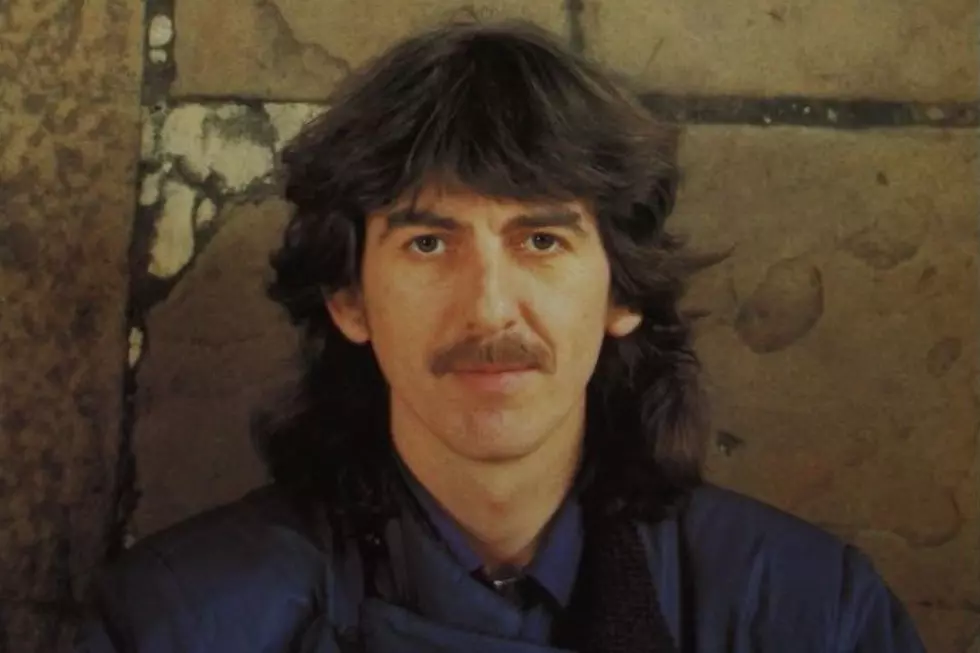
When George Harrison Tried to Salvage ‘Somewhere in England’
It took an unspeakable tragedy to get George Harrison's Somewhere in England onto the charts, and even then the album couldn't be saved.
Finally released on June 5, 1981, the project saw its first sessions back in October 1979. Along the way, Harrison was ordered by Warner Bros. to drop four of the original songs, as officials cautioned him that they were too downbeat.
"They were telling me: 'Well, we like it, but we don’t really hear a single,'" Harrison told Creem. "And then other people were saying, 'Now, look, radio stations are having all these polls done in the street to find out what constitutes a hit single and they’ve decided a hit single is a song of love gained or lost directed at 14-to-20-year-olds.' And I said, 'Shit, what chance does that give me?'"
As he struggled through the pre-release process, Harrison ended up turning to cover songs, including two Hoagy Carmichael tunes — “Baltimore Oriole” and “Hong Kong Blues” — which somehow made the executives’ cut. Frustrated, he also wrote the snarky "Blood From a Clone," an on-the-nose indictment of the current music scene. "They say they like it," Harrison sang, "but now in the market it may not go well, because it's too laid-back."
The relationship became so strained that Harrison had begun calling out Warner Bros., though he'd ultimately remain with the label for the rest of his career. "That kind of thing got me a bit pissed off," Harrison admitted, in a talk with Rolling Stone. "It was good to get that off my chest."
Listen to George Harrison Perform 'All Those Years Ago'
Still, put simply, Somewhere in England was going nowhere. Then the unthinkable happened: John Lennon was brutally murdered in December of 1980, prompting a return to a song Harrison had originally intended to give away to their former Beatles bandmate Ringo Starr.
Harrison kept an instrumental track also featuring Ringo that dated back to 1980, when the tune that would become "All Those Years Ago" was slated for a shelved Starr solo album titled Can't Fight Lightning. Over the top, Harrison added some of the most direct and heartfelt sentiments of his entire songwriting career. "I always looked up to you," he sang on the future No. 2 hit. "Now we're left cold and sad by someone – the devil's best friend, someone who offended all."
The recollection was made complete with the addition of a harmony vocal from Paul McCartney, who was joined by fellow Wings members Denny Laine and Linda McCartney. Rarely before had the Beatles come so close to a reunion, but the occasion couldn't have been sadder. "We grew up together," Harrison said during an October 1981 appearance on Good Morning America. "I was about 13 when I first met [Lennon]. He wanted to do something different, and likewise so did I and Paul. So, we gained strength from each other."
"All Those Years Ago" became Harrison's biggest single in nearly a decade – and his most successful song of the '80s until "Got My Mind Set on You" shot to the top of the Billboard charts some six years later. Finally, in February of 1981, Somewhere In England was complete.
Listen to George Harrison Perform 'Life Itself'
The gold-selling album, powered along by that ringing requiem for Lennon, became a Top 15 hit in both America and the U.K. – Harrison's first in his homeland since 1973's Living in the Material World. But it couldn't mask the larger issues at play. Neither could an all-star cast, beyond the partial Beatles reunion, that included Al Kooper, Jim Keltner, Gary Brooker and Dave Mattacks, among others.
"Life Itself" was the only other track of note, on a project that ultimately sounded as lost as its title. Harrison, he made clear at the time, was simply starting to lose interest – memorably decrying "the rot" that had set in for the music industry while on Good Morning America.
"Nobody knows what people want," Harrison told GMA's David Hartman, "or some people think they know what the public wants. So, it's got this great confusion. I think the most difficult thing is just to try and continue, and try to do what comes natural – and hope that somehow it still fits into the picture."
Harrison completed the lightly regarded Gone Troppo in 1982, then disappeared for the next five years.
Best Songs on Every George Harrison Album
More From WRKI and WINE










